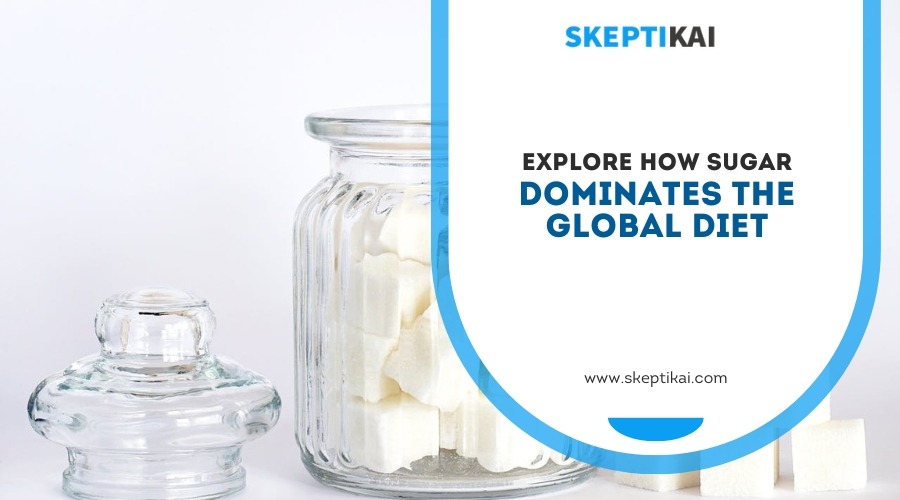It’s as if sugar has staged a global takeover, stealthily infiltrating every meal and snack you can think of. As you navigate through your daily diet, you’re likely unaware of how often you’re consuming added sugars, not just in the obvious culprits like sodas and sweets, but also in foods where they lurk unexpectedly.
This omnipresence contributes to a host of health issues, from weight gain to diabetes, yet the story doesn’t end there. Beyond its health impacts, sugar’s role in cultural and economic spheres is equally fascinating and complex.
As we peel back the layers of sugar’s dominance in our diets, you’ll discover there’s much more at stake than just your sweet tooth.
Sugar’s Evolution in Diets
Throughout history, sugar has evolved from a luxury to a staple in diets worldwide, significantly shaping our eating habits. Historical records reveal its use in ancient civilizations, indicating its long-standing significance. However, it’s the industrial revolution that truly accelerated sugar consumption, making it more affordable and integrating it into the global diet. This shift has seen sugar infiltrate processed foods, becoming a ubiquitous component of modern diets.
You’re now consuming an average of 17 teaspoons of sugar daily, largely due to hidden sugars in a wide array of products. These stealthy additions have made excess sugar intake a norm rather than an exception, posing a substantial challenge to public health. Despite the increasing awareness of the health risks associated with too much sugar, its prevalence in processed foods continues to bolster its dominance.
This surge in sugar consumption reflects not just a change in dietary preferences but also the influence of industrial advancements on food production. The result is a public health conundrum, where the ease of access to sugar-laden foods contradicts efforts to mitigate health risks. As sugar’s role in the global diet becomes ever more prominent, confronting its health implications remains a critical public health priority.
Health Implications Worldwide
Globally, the excessive consumption of sugar is a driving force behind the alarming rise in non-communicable diseases like obesity, type 2 diabetes, and heart disease. You’re living in a world where your global diet is increasingly dominated by added sugars, contributing significantly to public health concerns. It’s not just about the sweet taste; it’s the risk these sugars pose to your health, leading to metabolic syndrome, hypertension, and high triglycerides.
Countries around the world are grappling with the fallout, as both children and adults consume sugar well above recommended levels. This isn’t just a matter of individual choice; it’s a societal issue that’s leading to severe economic and health impacts. The comparison of sugar’s effects to those of alcohol by scientists highlights the urgency of the situation. Like alcohol, sugar’s contribution to liver toxicity and chronic diseases can’t be overlooked.
There’s a growing consensus that policy interventions are necessary. To mitigate the risks associated with high sugar consumption, governments and health organizations are being called upon to step in. Reducing sugar in the global diet isn’t just about improving individual health outcomes; it’s about safeguarding public health at large.
Hidden Sugars Unveiled
In many of your daily foods, hidden sugars lurk, often disguised under various names, thereby contributing to an excessive sugar intake that’s hard to detect. From the dressing on your salad to the sauce on your pasta, these added sweeteners are sneakily boosting your sugar consumption beyond what you might expect. You’re not just eating food; you’re unknowingly indulging in extra doses of sucrose, fructose, and corn syrup, among others.
Reading labels becomes a crucial skill in unmasking these covert sugars. However, with the myriad of names sugar hides under, it’s a challenging task. Processed foods are the usual suspects, packing hidden sugars that can easily double your intended intake. This isn’t just about taste—it’s a health concern. Excessive sugar in diets is linked to a host of issues, from weight gain to diabetes, making it imperative to stay vigilant.
To safeguard your health and keep your sugar consumption in check, it’s essential to educate yourself about these hidden sugars. Recognizing them on labels and understanding their prevalence in processed foods can help you make informed choices, reducing your overall intake and steering clear of the sweet trap hidden within your daily diet.
Cultural and Economic Impact
After uncovering the hidden sugars in your daily diet, let’s explore how sugar’s influence extends beyond health, shaping cultures and economies around the world. Sugar’s role in cultural traditions and celebrations can’t be overstated, deeply ingrained in dietary habits and preferences across the globe. Whether it’s sweetening a cup of tea as a sign of hospitality or being the centerpiece of festive desserts, sugar binds communities through shared experiences.
Economically, the sugar industry stands as a colossal force, with its production and trade significantly impacting international markets. The high demand for sugary products not only fuels economic growth in sugar-producing regions but also underscores the complex relationship between prosperity, health, and sustainability. However, this sweet success story isn’t without its bitter notes. Economic disparities often dictate access to sugary products, creating inequalities in sugar consumption and its associated health consequences. Such discrepancies highlight the challenges facing societies as they navigate the sweet allure of sugar against its potential health risks.
As sugar continues to dominate dietary preferences and cultural practices, its economic impact reverberates through global markets, raising important questions about sustainability, health, and equity.
Global Consumption Trends
Shifting dietary trends have led to a surge in sugar consumption worldwide, reflecting a growing preference for processed foods and sweetened beverages. This uptick is particularly noticeable in developing countries, where urbanization has introduced a wealth of processed options. As you navigate the global landscape, it’s clear that sugar-sweetened beverages are a significant contributor to excessive sugar intake. With each sip and bite, the intake of added sugars from these products climbs, fueling a rise in obesity and non-communicable diseases that challenge public health systems across the globe.
To paint a clearer picture, consider the following table illustrating key aspects of global consumption trends:
| Factor | Impact on Sugar Intake | Consequences |
|---|---|---|
| Processed Foods | Increase in Added Sugars | Rising Obesity Rates |
| Sugar-Sweetened Beverages | Primary Source of Excessive Intake | Non-Communicable Diseases |
| Urbanization | Shift Towards Convenient Foods | Increased Health Risks |
| Public Health | Strained by Dietary Shifts | Escalated Healthcare Costs |
These trends highlight an urgent need to address the dominance of sugar in our diets. While the allure of processed foods and sweetened beverages continues, the global community faces significant challenges in mitigating the impacts of excessive sugar intake.
Policy and Industry Responses
Recognizing the alarming trends in sugar consumption, countries and industries are taking decisive steps to curb the global sweetening of diets. Governments are rolling out sugar-sweetened beverage taxes and tightening marketing restrictions to dampen the appeal of these high-calorie drinks. It’s making a difference; in some regions, SSB taxation has noticeably reduced the purchases of taxed beverages.
But it’s not just about making sugary drinks less accessible; it’s also about informing you. Government-led information campaigns are on a mission to enlighten the public on the downsides of consuming sugar-sweetened beverages, aiming to steer you towards healthier diets.
Meanwhile, the food industry isn’t staying on the sidelines. Food package labeling and the reformulation of processed foods are becoming more common, helping you make informed and healthy choices at the grocery store. Yet, as global beverage companies eye emerging markets for expansion, the challenge persists.
It’s a dynamic battlefield where policy meets industry, and at its heart, it’s about empowering you to navigate the sugar-laden waters of today’s global diet, nudging you towards healthier consumption patterns.
Conclusion
You’ve seen how sugar’s infiltration into global diets isn’t just a matter of taste, but a complex issue with deep health, cultural, and economic roots. It’s clear that hidden sugars are everywhere, contributing to health issues across the globe.
As consumption trends rise, the need for effective policies and industry changes becomes more urgent. It’s in your hands to be aware and make informed choices, but remember, combating the sweet scourge is a collective effort that requires global action.





